UK Speed Limits and Fines - Do You Know the Law?
UK speed limits are a vital part of the UK’s road network. If you don’t know the laws, not only are you at risk of a fine, penalty points or disqualification, but more importantly, you’re putting yourself and other road users at risk.
Speed limits and fines can vary depending on several factors, and we think everyone should brush up on their knowledge every once in a while.
Take a look through our helpful guide and discover everything you need to know about the different speed limits and what penalties you could face if you break the law.
Jump to section:
How to know the speed limit of a road in the UK
What is the national speed limit?
What is the speed limit on a single and dual carriageway?
What is the speed limit on a motorway?
What does ‘variable speed limit’ mean?
What is the speed limit when driving a van?
What are the speeding penalties?
How are speeding fines calculated?
What are the speeding penalties?
Who gets the money from speeding fines?
Speeding fines for new drivers?
How to check speeding points on your licence?
How long do speeding points last?
do you have to declare speeding points on your car insurance?
Do you have to declare speeding points to an employer?
Speed Limits
Speed limits will vary depending on the type of road you’re on and the vehicle you’re driving.
Most roads with street lighting have a 30mph limit, unless otherwise stated. Limits are set for a reason and should not be exceeded.
Also, driving at the maximum limit doesn’t always mean that it is safe to do so. Road conditions and the weather can have an impact on your driving. Slow down when approaching a tight corner and always take it steady when it’s raining.
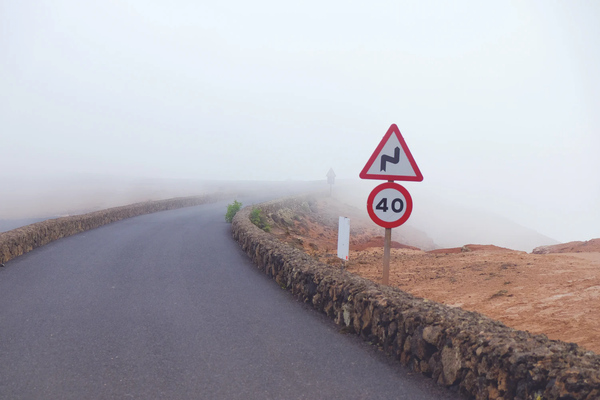
How to know the speed limit of a road in the UK
speed limits are always displayed in circular signs with red borders at both sides of the road or on lampposts and will often be repeated several times along the road
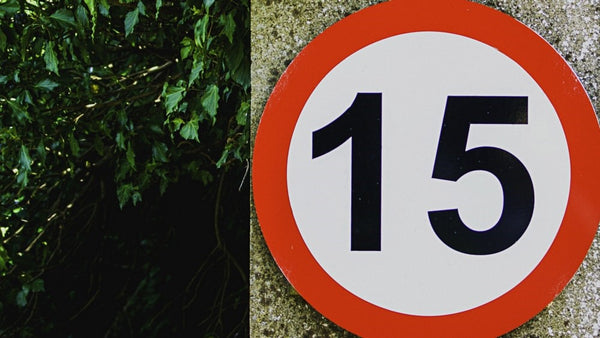
If you’re on a motorway, the limit may be displayed on signs above the carriageway.
If you see streetlights, the general rule is that the speed limit will be 30mph unless there’s a sign that states otherwise.
Roadworks can sometimes affect the maximum speed on roads and will be shown using temporary signs at the side of the road. The usual speed limit for roadworks is 50mph, however, Highways England recently announced raising the limit to 60mph to increase traffic flow and reduce tailgating by motorists.
What is the national speed limit?
The national speed limit is represented by a white circular sign that has a black stripe diagonally across it from right to left.

The speed limit varies between 60mph to 70mph depending on the type of road and the vehicle you’re driving.
What is the speed limit on a single and dual carriageway?
Cars, motorcycles, car-derived vans, dual purpose vehicles and motorhomes under a certain weight have a speed limit of 60mph on a single and 70mph on a dual carriageway.
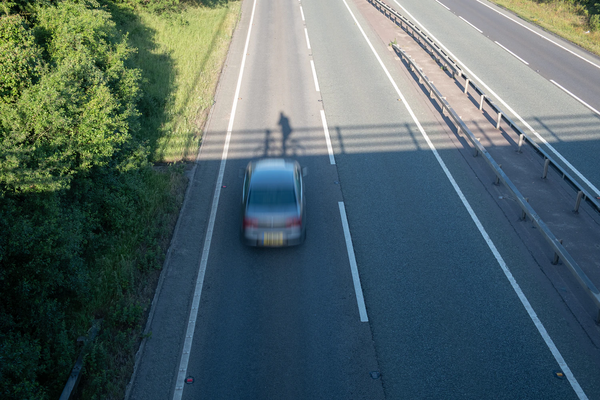
If you are towing a caravan or trailer, driving a motorhome above 3.05 tonnes or are driving a bus, coach or a goods vehicle, the speed limit drops to 50mph on a single and 60mph on a dual carriageway.
In Scotland, goods vehicles weighing more than 7.5 tonnes are limited to 40mph on a single and 50mph on a dual carriageway.
What is the speed limit on a motorway?
On a motorway, your speed should not exceed 70mph for most vehicles. This includes cars, motorcycles, motorhomes, buses and goods vehicles not towing a trailer.

The speed limit drops to 60mph if you are a vehicle towing a caravan or trailer, driving a bus over 12m in length, a goods vehicle over 7.5 tonnes or towing a trailer in England, Scotland and Wales.
What does ‘variable speed limit’ mean?
Variable speed limits are a flexible restriction given to motorists. The limit is set automatically and can be changed depending on the condition of the road, such as congestion, hazards or accidents.
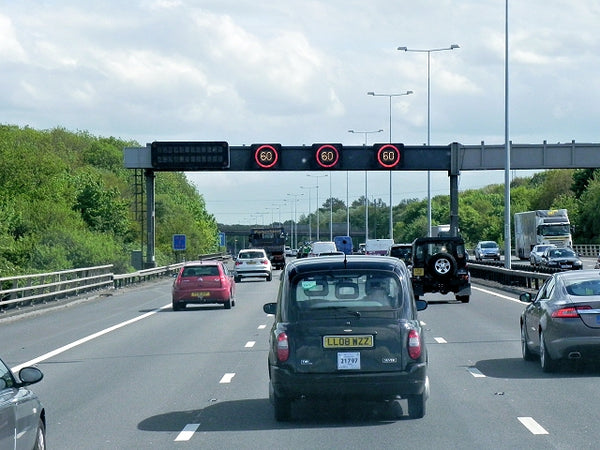
These variable speed limits are often seen on smart motorways across the UK and are controlled by Highways England.
The new speed limit can be changed at any time and is displayed on overhead gantries to alert motorists. Motorists should never exceed the limit shown as these are enforced by law and you can still be caught at any time.
What is the speed limit when you’re driving a van?
The speed limit of a van differs slightly to that of a car and depends on the type of road you’re driving on.
On a single carriageway, vans are limited to 50mph as opposed to 60mph. On a dual carriageway, the speed limit for a van is 60mph and on a motorway, the speed limit remains 70mph - the same for a car.
Speeding Fines
Exceeding the speed limit at any time is illegal, if you’re caught, you’ll be fined, issued points on your licence and could potentially even be prosecuted.
The number of points and the value of the fine will depend on how serious the offence is.
What are the speeding penalties?
The minimum speeding penalty for speeding is a fine of £100 and 3 points on your licence. In some cases, you can avoid the both of these by attending a speed awareness course.
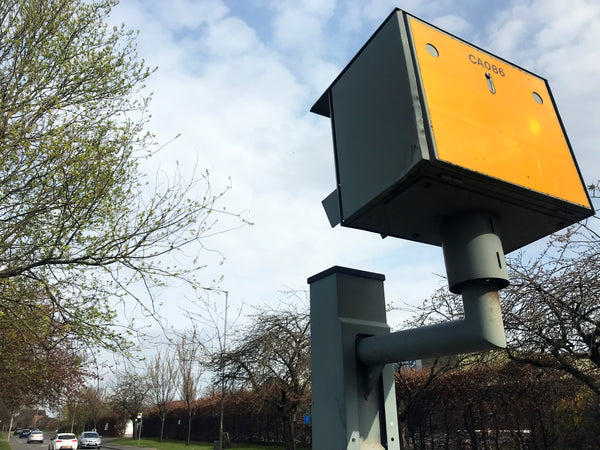
Image: DPP Law
If you’re caught by a speed camera, within 14 days you will receive a Notice of Intended Prosecution (NIP) and a Section 172 (of the Road Traffic Act) notice.
28 days will be given to return the Section 172 notice and declare who was driving the car at the time of speeding. If you the notice is ignored, a court order may be given.
After you have sent the notice back, you’ll receive either a Fixed Penalty Notice (FPN) or a letter inviting you to court.
If you’re caught and stopped by the police, they can give you any one of the following:
- Verbal warning
- Fixed Penalty Notice (FPN)
- Court order
With a Fixed Penalty Notice, you can choose to plead guilty and pay the fine or contest the fine in court.
If you plead guilty you will have to pay the £100 fine and receive 3 points to your licence, unless attending a speed awareness course is an option. A speed awareness course will be given as an option if the police decide it is appropriate for your offence or you haven’t previously attended the course within the past 3 years.
A fine can be contested in court, whereby you will have to prove one of the following:
- You were not speeding
- You weren’t the driver of the vehicle
- The speed limit wasn’t noticeable
- The vehicle wasn’t yours or the car was stolen
If these cannot be proven, you’re at risk of a higher penalty, resulting in an increased fine and additional points on your licence.
Depending on how serious the offence was, you could also be disqualified from driving or have your licence suspended.
How are speeding fines calculated?
The maximum speeding fine is £1,000 unless you were caught on the motorway, in which case the maximum increases to £2,500.
The amount you’re fined depends on the speed limit and how much it was exceeded. This is split into three bands: Band A, Band B and Band C.
Band A
You will receive 3 penalty points and fined 50% of your weekly income, though it can be within the range of 25-75%.
|
Speed Limit (mph) |
Recorded Speed (mph) |
|
20 |
21-30 |
|
30 |
31-40 |
|
40 |
41-55 |
|
50 |
51-65 |
|
60 |
61-80 |
|
70 |
71-90 |
Band B
You will receive 4 to 6 penalty points on your licence or disqualified from driving for 7 to 28 days. You will be fined 100% of your weekly income, though it can be within the range of 75-125%.
|
Speed Limit (mph) |
Recorded Speed (mph) |
|
20 |
31-40 |
|
30 |
41-50 |
|
40 |
56-65 |
|
50 |
66-75 |
|
60 |
81-90 |
|
70 |
91-100 |
Band C
You will receive 6 penalty points on your licence or receive a driving disqualification for 7 to 56 days. You will be fined 150% of your weekly income, though it can be within the range of 125-175%.
If the motorist is driving grossly in excess of the speed limit, the court can increase the disqualification to over 56 days.
|
Speed Limit (mph) |
Recorded Speed (mph) |
|
20 |
41+ |
|
30 |
51+ |
|
40 |
66+ |
|
50 |
76+ |
|
60 |
91+ |
|
70 |
101+ |
Who gets the money from speeding fines?
According to HM Treasury, the money from speeding fines goes into the Consolidated Fund, regarded as the central Government’s bank account.
It is then used towards general Government expenditure rather than being ring-fenced for specific spending. You can read more about the Consolidated Fund here.
Speeding fines for new drivers
If you’re a new driver and still within 2 years of passing your driving test, you will receive the minimum fine of £100 and 3 points on your licence. However, for more severe offences, you will face tougher penalties. If you build up more than 6 points on your licence within your first 2 years, your licence will be revoked.
If you receive points on your provisional licence that have not expired, these will carry over to your full licence when you pass your driving test.
Speeding Points
As well a fine for speeding, you will also receive penalty points on your licence. The number of points issued will be decided by how far you have exceeded the limit (explained in the Band sections above).
How to check speeding points on your licence
You can visit the GOV.UK website to view your driving licence record and see how many penalty points you have and when they will be removed.
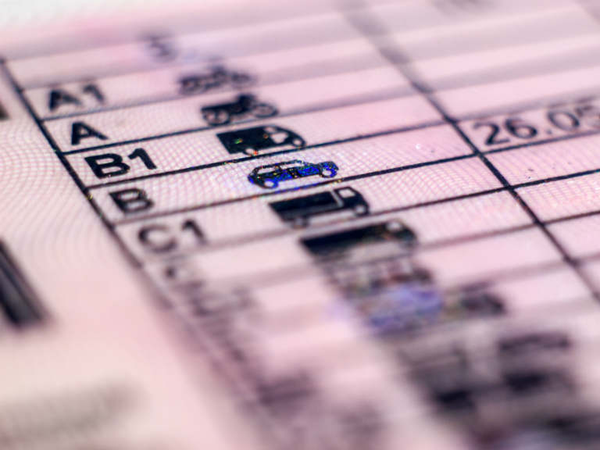
How long do speeding points last?
Penalty points stay on your driving licence record for a total of 4 years from the date of the driving offence, but they are only valid for the first 3 years.
If you have committed a more serious offence e.g. drink driving, the points will stay on your licence for 11 years and be valid for 10 years.
Do you have to declare speeding points on your car insurance?
It is an offence to withhold any relevant information when applying for insurance – it is a legal requirement to inform your insurer of penalty points. If you do have points on your licence, insurers will be able to find this out anytime during the 4 years or during the first 5 of the 11 years of you having committed the offence.
Do you have to declare speeding points to an employer?
By law you are not required to declare any points on your licence, however, in some cases employers will require staff to have a full, clean driving licence.
If you are asked about your driving convictions, these should be declared to make your employer aware and avoid any complications.
Like insurers, employers will be able to find out if you have points on your licence anytime during the 4 years or during the first 5 years of an 11-year endorsement. If you are under 18, this will drop to the first 2 and a half years.
Speed limits are vital and put in place to keep you and other road users safe. They’ve been put in place for a reason and shouldn’t be ignored.
Our blog post on road sign meanings is a great refresher for for drivers of all experiences. You can find out more about the UK driving licence in our handy guide.